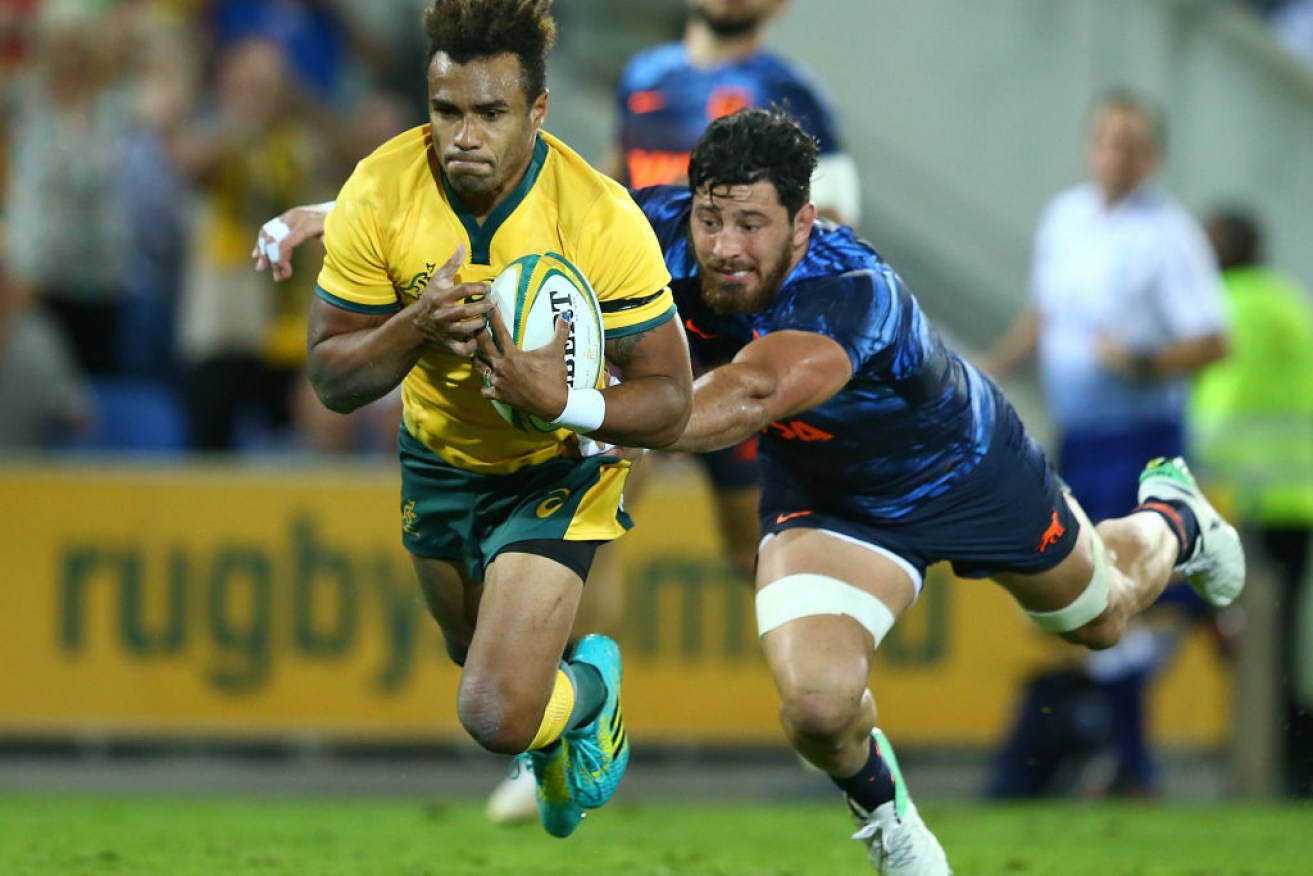English media’s ill-informed swipe at Wallabies’ ring-ins


Will Genia: Yes, born in Papua New Guinea. Just don't tell him he's not an Aussie. Photo: Getty
Quick question: Which squad in the Rugby World Cup has the most foreign-born players.
Answer at the end of the article – and don’t skip ahead.
It wouldn’t be a Rugby World Cup without the odd sportswriter sledging teams.
The Sunday Times rugby correspondent Stephen Jones has managed to sledge both the Wallabies and England’s coach before their quarter-final this Saturday.
Well, the English coach is Australian. And Jones is Welsh. And he also is very wrong – not that The Sunday Times readership would care.
In a column mainly spent casting doubt on Eddie Jones’ preparation of England and thinking that the England v France match being abandoned could see Australia win (good work, Stephen, keep sowing seeds of doubt), Stephen Jones still manages to sideswipe Australia, entering the murky waters of where players come from, while delivering some bouquets and brickbats.
“This Australian team is profoundly different to any who suffered in that run of defeats,” S. Jones opines, referring to the past six meetings between Australia and England – all won by England.
“For a start they are about as Australian as the Hanging Gardens of Babylon. They are a Pacific Island conglomerate and have done Wales an enormous favour.
“Had all Australian’s Fijian contingent in the squad and around it been available for Fiji in that glorious match in Oita last week, Wales may have been packing their bags this weekend instead of cruising on to the quarters.
“The feeble Australian pack of recent years has been shored up by the massive Tolu Latu at hooker and Allan Alaalatoa upfront.
“Scott Sio, so quiet in 2015 in England, (when the Wallabies and Wales saw that England didn’t make the quarters) has been in sensational form, arguably the best loose-head in the tournament. Isi Naisarani, yet another Fijian, (um, he’s the first one you’ve mentioned, Stephen) has added a ball carrier to their attack.
“Of course they have weaknesses. At five-eighth, Bernard Foley is way off his old form (doubt he’ll be playing, Steve); Matt To’omua came on and made a flashy start against Wales but did not back up that form. And Christian Lealiifano is frail in build, if soaring in morale.
“But do not forget that for 20 minutes in the second half against Wales they looked all over the winners. (Actually, they were the better side for more like 50 minutes of the match.) They had heavy men pounding at close quarters, with Samu Kerevi at the apex.”
We’ll skip the other stuff and look at the central sledge – “the Wallabies aren’t really Australian.” S. Jones doesn’t understand modern Australia.
The question of place of origin has been stirred up before during the RWC and the rules are being changed to require five – rather than three – years residency to qualify.
Simplistic readings of “foreigner-sounding” names and places of birth don’t tell the real story. There were plenty of those in the 2015 RWC side anyway.
The Wallabies 2019 RWC squad of 31 has 12 players who were not born in Australia, but 10 of those 12 were raised in Australia.
We are happily and fortunately a nation of migrants. Nearly 29 per cent of us were born overseas. Nearly half of us have at least one parent born overseas.
The Americasrugbynew.com site has done the best job I’ve seen of cutting through the cheap and misleading shots to tell the real story about player origins, listing place of birth, but also where the player was raised and how they qualified for their country.
Tell Will Genia he’s not Australian because he was born in Papua New Guinea. Ditto that foreign-born David Pocock. New Zealand-born Lealiifano made his three-year residency requirement in 1997 – I reckon a quarter of a century probably qualifies as pretty Aussie.
The only two relatively recent arrivals are Naisarani, who qualified this year, and Taniela Tupou, who qualified in 2017. So, depending on what month of 2017 that was, only one of the present squad would be troubled by the five-year rule if it were in force now.
The Wallabies aren’t a “Pacific Islands conglomerate”, Mr Jones, they are the result of the international conglomeration that makes Australians Australians – the joyous multinational mix we should be very proud of. From the player with the oldest links to this country, Kurtley Beale, to the most recent arrival, it’s an Australian team, mate.
Besides, rugby union luxuriates in being a great international game. Turn up just about anywhere on Earth and you can find a rugby club and a game and kindred spirits and friendship. It’s a globalisation joy.
And it really is the game they play in Heaven, where everyone is simply listed as coming from Earth.
P.S. “The Hanging Gardens of Babylon” was a particularly strange simile for what Mr Jones was trying to say. I suspect he might have meant something like the Tower of Babel – wrong again.
P.P.S. There’s some serious folding money to be won betting innocent souls on the details in the Americasrugbynews.com piece.
For example: Which RWC squad has the most foreign-born players?
Tonga.
Which has the second most?
Samoa.

As Japanese as Johannesburg, as Scottish as South Auckland. Photo: AAP
Japan has 16, Scotland 15, USA 13, then us.
The English squad, not counting the coach, has six including Mako and Billy Vunipola, Manu Tuilagi and Joe Cokanasiga. Does that that make them a Pacific conglomerate?
And while Australia has 12 foreign-born players in the Wallabies squad, guess how many Australian-born players are representing other nations at the RWC?
We are running an international player trade surplus – 13.








